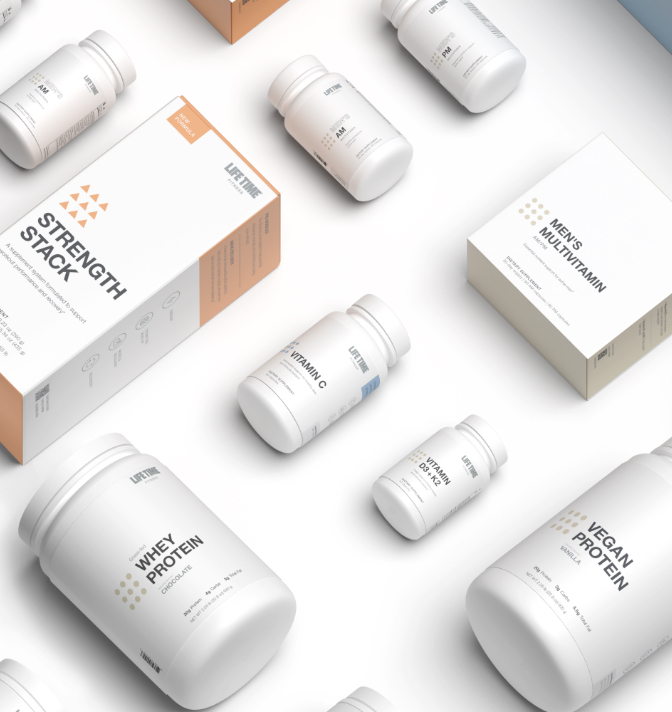Indigestion, poor energy, bloating, stubborn weight loss, skin problems, poor immunity, inconsistent bowel patterns, mental fog, low mood . . . sounds like a typical week, right?
Wrong. Just because many of these ailments are common, does not mean they are normal.
Our entire body suffers when our digestive system is not operating as designed, and it can be extremely difficult to optimize gastrointestinal (GI) well-being if you don’t have a comprehensive plan for doing so. A good GI health protocol helps you set a strong foundation for the three main areas of the GI tract: digestion and absorption of nutrients, gut barrier integrity, and bacterial biodiversity.
A good protocol also makes use of a smart nutrition strategy, a targeted supplement approach, and specific lifestyle adjustments to promote better gut health.
Because we coach so many individuals with signs and symptoms of disrupted gut health, we developed a program and supplement system designed to support your efforts to reset your digestive health. The GUT.FIX® program is a monthlong program that integrates our top three recommended supplements for restoring digestive integrity and gut health.
Here are the reasons why these specific supplements made it into our GUT.FIX® protocol.
Digestive Enzymes
Enzymes are biological molecules that speed up or facilitate thousands of chemical reactions in the body. Our bodies make an entire class of enzymes that are responsible for breaking down our food into the smallest possible components (proteins –> amino acids, carbohydrates –> glucose, fatty acids –> free fatty acids), as well as freeing up vitamins and minerals for absorption. Without sufficient enzyme activity, the food we eat literally cannot nourish us.
As we age, our natural production of digestive enzymes declines rather significantly, which can seriously alter how your body breaks down food and absorbs nutrients. Many believe these declines are caused by chronic stress, over-the-counter and prescription medications, and poor eating habits — all of which may contribute to diminished digestive capacity .
I’ve worked with many clients who make excellent quality food choices, but still suffer from digestive distress, whether it’s gas, bloating, indigestion, or belching. Other clients seem to be completely free of these upper GI ailments but suffer from abnormal or inconsistent bowel patterns. Sometimes they suffer from alternating constipation or diarrhea, urgency, or if they dare to admit it, undigested food particles in their stools.
As graphic as this sounds, if someone’s poop isn’t a “3” or “4” on the Bristol Stool Scale, there’s something about their digestion that could/should/needs to be addressed.
The easiest strategy for any of these cases is to introduce supplemental digestive enzymes at all meals. This is important because many people neglect to chew their food well enough to facilitate proper breakdown and absorption of nutrients.
Digestive-enzyme supplementation for digestive disorders is well-documented and widely accepted by health practitioners, and it can offer some surprisingly quick relief for many of the aforementioned instances.
Supplemental digestive enzymes are a relatively low-risk strategy to help improve the digestive capacity of your GI system because they are literally just exogenous (external) sources of the enzymes your body should already be manufacturing.
If you don’t have adequate enzyme activity, however, you can’t properly digest, absorb, and utilize the proteins you eat to make enzymes in the first place.
Supplementing with digestive enzymes for a couple of months can be a temporary strategy, as the improved digestion and absorption can lead to improvements to your own internal digestive-enzyme production.
“Broad-spectrum” digestive enzyme are a great option for general use for those with mild or moderate digestive symptoms. The Life Time Digestive Enzyme Complex is considered “broad spectrum” because it contains enzyme support that will promote the breakdown of proteins, fats, carbohydrates, and fibers.
Two capsules with each solid food meal offers most people some digestive relief.
Key takeaway: There’s a good chance supplementing with extra enzymes (even temporarily) will improve nutrient absorption and alleviate symptoms related to indigestion.
Note: Digestive-enzyme supplements like Digestive Enzyme Complex are not recommended for those with ulcers or for those who take medication that may irritate the lining of the stomach, such as non-steroidal anti-inflammatory drugs (NSAIDs).
L-Glutamine
L-glutamine is a conditionally essential amino acid. This means that under certain conditions, our body cannot make enough of this important amino acid to maintain normal (or optimal) biological health.
It’s also the most abundant amino acid in our body. But just as our modern lifestyles can diminish digestive enzyme production and function, our L-glutamine status can end up being subpar as well.
It’s well known that some serious catabolic health conditions (severe burns, certain cancers, and AIDS, for example) dramatically increase our needs for L-glutamine, as well as other nutrients). In these clinical scenarios, L-glutamine supplementation significantly improves the prognosis of critically ill patients, in part by nourishing the physiologic intestinal barrier and by reducing the frequency of infections.
It does so through a number of important mechanisms involved in the regulation of gene expression, new cell growth and development, protein turnover (repair), and anti-oxidative properties, and by promoting immune health.
In other words, even when the whole body seems to be breaking down, extra L-glutamine is effective at nourishing the delicate cells lining our intestines and improving whole body health.
Perhaps less well known is that our L-glutamine requirements also increase as a result of several not-so-critical instances that we may face every day: strenuous exercise, marginal immune-system function, and disrupted digestive barrier integrity.
That last one is probably more common than we think: Damaged intestinal villi, which are called enterocytes, can result from our modern dietary choices, food sensitivities, alcohol consumption, medications, toxin exposure, or general lifestyle habits that contribute to the breakdown of our bodies.
Whether you work hard at the gym or work hard to relax by having a few cocktails at night, the lining of your digestive system may be encountering some damage you’re not currently accounting for.
Fortunately, adding L-glutamine to your routine may help cut down the tissue damage, which is often referred to gastrointestinal permeability, or “leaky gut.” It’s even been shown to improve exercise performance and strength in otherwise healthy individuals.
I know that supporting the health of your intestinal lining doesn’t sound all that exciting, but something that is exciting for many of my clients is weight loss. According to one study, “leaky gut” may be a direct cause for belly fat gain.
Another study showed that oral glutamine supplementation alters gut microbiota of obese and overweight adults in ways that support weight loss. Over just a few weeks, the study showed that participants getting the L-glutamine seemed to experience beneficial changes in the balance of bacteria to favor bacteroidetes type rather than firmicutes type, which affects how our bodies extract calories from our food (or not).
It usually doesn’t take much L-glutamine to support the above benefits: Generally, 5 grams of odorless, colorless powder can be added to any food or drink one to three times per day.
Key takeaway: If you have compromised intestinal health, poor immune function, and/or prolonged soreness after exercise, consider taking some additional L-glutamine.
Probiotics
Question: What’s different about overweight or obese people compared to lean people?
Answer: Probably a lot, starting with the types of bacteria living in their guts. Lean people tend to have more bacteroides and fewer firmicutes, while overweight and obese subjects have the opposite.
This matters because there are hundreds of thousands of bacteria that symbiotically live primarily in our large intestine. While we’re still learning about the many complexities and intricacies of our intestinal flora, (a.k.a. microbiome), we already know for certain that these bacteria do not just sit idle in our insides. The bacteria in our colon are so important that our gut is now being referred to as our “second brain”.
This “second brain” may have a great deal of influence over our weight control, according to the latest research consensus.
A healthy array of the right types of microorganisms in your gut does several helpful things, including manufacturing certain vitamins, using indigestible fibers to make short-chain fatty acids the body uses for energy, stimulating the body’s immune system, and regulating the integrity of the gut lining itself.
It’s also known that over 90 percent of the serotonin (the “feel-good” neurotransmitter found in our brain) is manufactured by the bacteria in our colon. There’s that “second brain” thing again.
Our brain and digestive system operate a complex, direct, two-way communication system that literally affects every other metabolic system in our body.
Disarray of your intestinal flora, or dysbiosis, is associated with significantly higher risk of developing a number of chronic diseases.
Probiotic supplements are live microorganisms that can be taken orally; in certain amounts, they can offer health benefits to the “host” (you). Outside of some experimental fecal transplants, regularly eating some fermented foods and taking a broad-spectrum probiotic supplement are the best strategies to help promote a more optimal balance of “good” to “bad” bacteria in your colon.
Life Time’s MultiPro 30B probiotic is a blend of six different bacterial strains that deliver over 30 Billion colony-forming units (CFUs) of bacteria per capsule.
Key takeaway: Taking a daily probiotic supplement featuring a variety of microorganisms may have beneficial effects throughout the entire body.
Bonus: GABA and 5-HTP
It’s been observed that people with compromised digestive health (leaky gut) often suffer from some form of psychological condition, such as depression, anxiety or overactive brain activity often related to demanding lifestyles.
These conditions are characterized by diminished activity of two very important neurotransmitters in the brain: serotonin and gamma-aminobutyric acid (GABA), whose production in our body is dependent on having healthy bacterial biodiversity in our gut.
Serotonin is supposed to balance out the effects of excitatory neurotransmitters (namely dopamine), while GABA is known to put the brain into a state of calm, clear, relaxation known as “alpha wave state.” In fact, people for whom standard antidepressants do not work have the lowest GABA levels, as do those with drug or alcohol dependency.
The vast majority of antidepressants prescribed today are aimed at increasing serotonin activity in the brain. The majority of antianxiety medications work by increasing GABA receptor sites in the brain. Both of these strategies are attempts to make up for low amounts or insufficient activity of these two very important, calming, “feel-good” neurotransmitters.
Both GABA and a serotonin precursor known as 5-Hydroxytryptophan (5-HTP) are included in Life Time’s Restore PM sleep support supplement, which may also be a helpful product to incorporate into a digestive health restoration program.
Need a Gut Fix?
Whether you have a gut feeling your digestive system needs a reboot or a thought in your brain that your mood, affect, or mental resilience needs some support, you may be a great candidate for our comprehensive GUT.FIX® program. We recommend following the entire GUT.FIX® plan. But as you read above, simply introducing some targeted supplements to support your gut’s function can offer a great deal of help.
What have you got to lose?
References
Carding S, Verbeke K, Vipond DT, et al. Dysbiosis of the gut microbiota in disease. Microb Ecol Health Dis. 2015;26;26191
Chaudhry KK, Shukla PK, Mir H, et al. Glutamine supplementation attenuates ethanol-induced disruption of apical junctional complexes in colonic epithelium and ameliorates gut barrier dysfunction and fatty liver in mice. J Nutr Biochem. 2016;27;16-26
Cox AJ, West NP, Cripps AW. Obesity, inflammation, and the gut microbiota. Lancet Diabetes Endocrinol. 2015;3(3);207-215
Cummings JH, Macfarlane GT. Role of intestinal bacteria in nutrient metabolism. J Parenter Enteral Nutr. 1997;21(6);357-365
De-Souza DA, Greene LJ. Intestinal permeability and systemic infections in critically ill patients: Effect of glutamine. Crit Care Med. 2005;33(5);1125-1135
Gummesson A, Carlsson LMS, Storlien LH, et al. Intestinal Permeability Is Associated With Visceral Adiposity in Healthy Women. Obesity. 2011;19(11);2280-2282
Legault Z, Bagnall N, Kimmerly D. The influence of oral L-glutamine supplementation on muscle strengthrecovery and soreness following unilateral knee extension eccentric exercise. Int J Sport Nutr Exe Metab. 2015;25
Natarajan N, Pluznick JL. From microbe to man: the role of microbial short chain fatty acid metabolites in host cell biology. Am J Physiol Cell Physiol. 2014;307(11);C979-985
Prescot AP, Renshaw PF, Yurgelun-Todd DA. Gamma-Amino butyric acid and glutamate abnormalities in adolescent chronic marijuana smokers. Drug Alcohol Depend. 2013;129(3);232-239
Price RB, Shungu DC, Mao X, et al. Amino acid neurotransmitters assessed by proton magnetic resonance spectroscopy: relationship to treatment resistance in major depressive disorder. Biol Psychiatry. 2009;65(9);792-800
Roxas M. The role of enzyme supplementation in digestive disorders. Altern Med Rev. 2008;13(4);307-314
Trachte GJ, Uncini T, Hinz M. Both stimulatory and inhibitory effects of dietary 5-hydroxytryptophan and tyrosine are found on urinary excretion of serotonin and dopamine in a large human population. Neuropsychiatr Dis Treat. 2009;5;227-235
URL DOES NOT WORK DNCFN.). http://gradworks.umi.com/15/89/1589314.html
Wang B, Wu G, Zhou Z, et al. Glutamine and intestinal barrier function. Amino Acids. 2015;47(10);2143-2154
Wright J, Lenard L. Why stomach acid is good for You: natural relief from heartburn, indigestion, reflux and GERD. Lanham, MD, M. Evans & Company. 2001;208
Yano Jessica M, Yu K, Donaldson Gregory P, et al. Indigenous bacteria from the gut microbiota regulate host serotonin biosynthesis. Cell. 2015;161(2);264-276
Zambom de Souza AZ, Zambom AZ, Abboud KY, et al. Oral supplementation with l-glutamine alters gut microbiota of obese and overweight adults: A pilot study. Nutrition. 2015;31(6);884-889
Zhang Q, Wu Y, Fei X. Effect of probiotics on body weight and body-mass index: a systematic review and meta-analysis of randomized, controlled trials. Int J Food Sci Nutr. 2015;67(5);571-580
Zuhl MN, Lanphere KR, Kravitz L, et al. Effects of oral glutamine supplementation on exercise-induced gastrointestinal permeability and tight junction protein expression. J Appl Physiol (1985). 2014;116(2);183-191





This Post Has 0 Comments